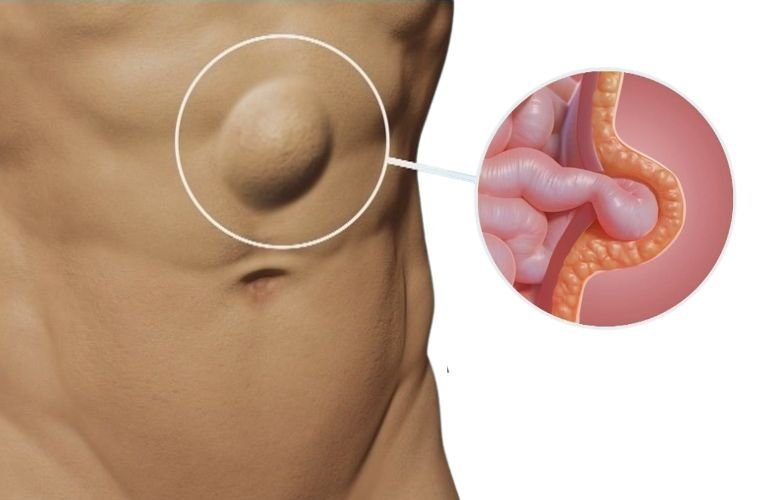Hernia
A hernia occurs when an internal organ or tissue protrudes through a weak spot in the surrounding muscle or connective tissue. While hernias can develop in various parts of the body, they most commonly occur in the abdomen or groin area. This condition can cause discomfort, pain, and other complications if left untreated. Understanding its symptoms, treatment options, and preventive measures is crucial for managing hernias effectively.

Symptoms :
The symptoms of a hernia can vary depending on its location and severity. Common signs and symptoms include:
- Visible Lump : A noticeable bulge or lump, particularly when standing up or straining, is a typical indicator of a hernia. This bulge may disappear when lying down.
- Discomfort or Pain : Patients often experience discomfort or pain, especially during activities such as lifting, bending, or coughing. The pain may worsen as the day progresses or after physical exertion.
- Weakness or Pressure : Some individuals with hernias report feelings of weakness, pressure, or a dragging sensation in the affected area.
- Digestive Issues : In cases where a hernia affects the digestive tract, symptoms such as heartburn, difficulty swallowing, or abdominal discomfort may occur.
- Swelling and Redness : If a hernia becomes incarcerated or strangulated, it can lead to swelling, redness, and increased pain in the affected area. These are signs of a medical emergency and require immediate attention.
Treatment Options:
The treatment approach for hernias depends on several factors, including the size and location of the hernia, the presence of symptoms, and the patient's overall health. Treatment options may include:
- Watchful Waiting: In cases where the hernia is small and asymptomatic, healthcare providers may recommend a watchful waiting approach, with regular monitoring to detect any changes in size or symptoms.
- Lifestyle Modifications : Making certain lifestyle changes, such as avoiding heavy lifting, maintaining a healthy weight, and practicing proper lifting techniques, can help prevent hernias from worsening.
- Medications : Over-the-counter pain relievers may provide temporary relief from hernia-related discomfort. However, medications alone cannot repair a hernia or prevent its progression.
- Hernia Repair Surgery : Surgical intervention is often necessary to repair a hernia and prevent complications. Depending on the type and severity of the hernia, different surgical techniques may be employed, including traditional open surgery or minimally invasive laparoscopic procedures.
- Mesh Repair : In many cases, surgeons use a synthetic mesh to reinforce the weakened area and provide additional support during hernia repair surgery. This technique can help reduce the risk of hernia recurrence.
